Analysis of Entrepreneurial Ventures and Small Business Impact
VerifiedAdded on 2020/10/22
|14
|4225
|224
Report
AI Summary
This report delves into the realm of entrepreneurship and small business management, exploring various types of entrepreneurial ventures, their similarities, and differences. It examines the impact of small businesses on the UK economy, highlighting employment generation, cash flow, and infrastructure development. The report also emphasizes the importance of small businesses and start-ups in fostering social and economic growth, detailing the characteristics, traits, and skills of successful entrepreneurs. Furthermore, it analyzes how entrepreneurial personalities, motivations, and backgrounds influence the development and success of entrepreneurial ventures. The report provides an overview of the key aspects of entrepreneurship, including the relationship between different entrepreneurial typologies and real-world examples, making it a valuable resource for students studying business and entrepreneurship.

Entrepreneurship and Small
Business Management
Business Management
Paraphrase This Document
Need a fresh take? Get an instant paraphrase of this document with our AI Paraphraser
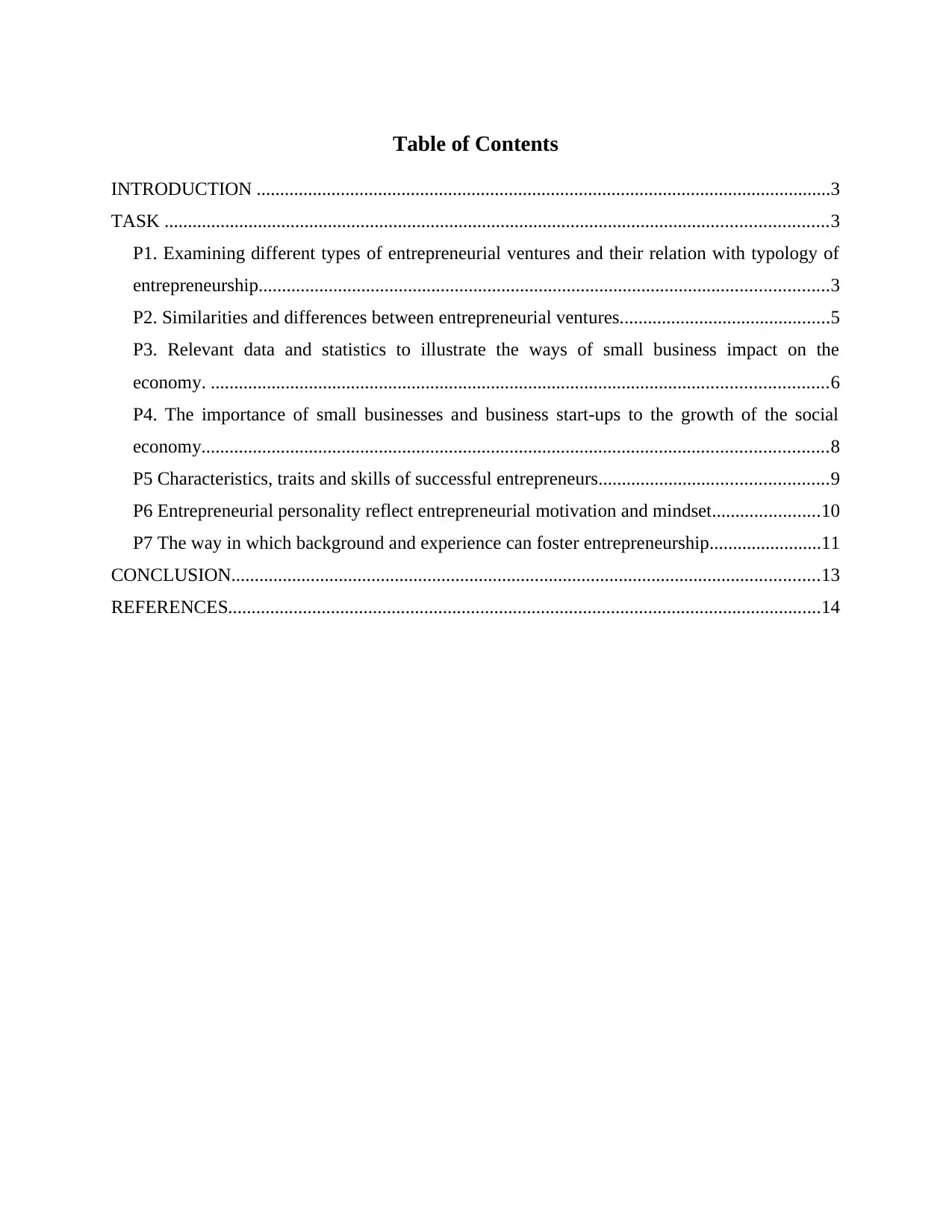
Table of Contents
INTRODUCTION ...........................................................................................................................3
TASK ..............................................................................................................................................3
P1. Examining different types of entrepreneurial ventures and their relation with typology of
entrepreneurship..........................................................................................................................3
P2. Similarities and differences between entrepreneurial ventures.............................................5
P3. Relevant data and statistics to illustrate the ways of small business impact on the
economy. ....................................................................................................................................6
P4. The importance of small businesses and business start-ups to the growth of the social
economy......................................................................................................................................8
P5 Characteristics, traits and skills of successful entrepreneurs.................................................9
P6 Entrepreneurial personality reflect entrepreneurial motivation and mindset.......................10
P7 The way in which background and experience can foster entrepreneurship........................11
CONCLUSION..............................................................................................................................13
REFERENCES...............................................................................................................................14
INTRODUCTION ...........................................................................................................................3
TASK ..............................................................................................................................................3
P1. Examining different types of entrepreneurial ventures and their relation with typology of
entrepreneurship..........................................................................................................................3
P2. Similarities and differences between entrepreneurial ventures.............................................5
P3. Relevant data and statistics to illustrate the ways of small business impact on the
economy. ....................................................................................................................................6
P4. The importance of small businesses and business start-ups to the growth of the social
economy......................................................................................................................................8
P5 Characteristics, traits and skills of successful entrepreneurs.................................................9
P6 Entrepreneurial personality reflect entrepreneurial motivation and mindset.......................10
P7 The way in which background and experience can foster entrepreneurship........................11
CONCLUSION..............................................................................................................................13
REFERENCES...............................................................................................................................14
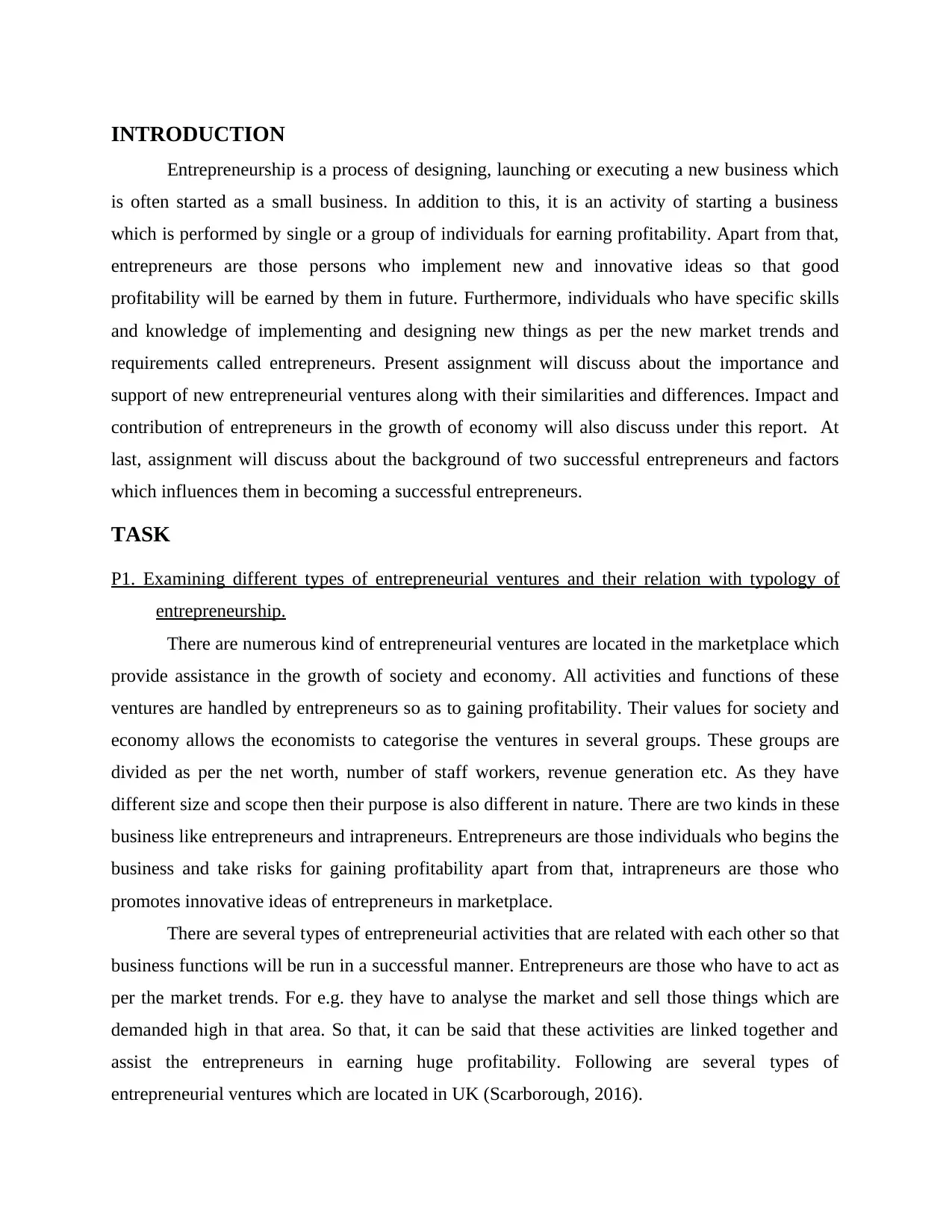
INTRODUCTION
Entrepreneurship is a process of designing, launching or executing a new business which
is often started as a small business. In addition to this, it is an activity of starting a business
which is performed by single or a group of individuals for earning profitability. Apart from that,
entrepreneurs are those persons who implement new and innovative ideas so that good
profitability will be earned by them in future. Furthermore, individuals who have specific skills
and knowledge of implementing and designing new things as per the new market trends and
requirements called entrepreneurs. Present assignment will discuss about the importance and
support of new entrepreneurial ventures along with their similarities and differences. Impact and
contribution of entrepreneurs in the growth of economy will also discuss under this report. At
last, assignment will discuss about the background of two successful entrepreneurs and factors
which influences them in becoming a successful entrepreneurs.
TASK
P1. Examining different types of entrepreneurial ventures and their relation with typology of
entrepreneurship.
There are numerous kind of entrepreneurial ventures are located in the marketplace which
provide assistance in the growth of society and economy. All activities and functions of these
ventures are handled by entrepreneurs so as to gaining profitability. Their values for society and
economy allows the economists to categorise the ventures in several groups. These groups are
divided as per the net worth, number of staff workers, revenue generation etc. As they have
different size and scope then their purpose is also different in nature. There are two kinds in these
business like entrepreneurs and intrapreneurs. Entrepreneurs are those individuals who begins the
business and take risks for gaining profitability apart from that, intrapreneurs are those who
promotes innovative ideas of entrepreneurs in marketplace.
There are several types of entrepreneurial activities that are related with each other so that
business functions will be run in a successful manner. Entrepreneurs are those who have to act as
per the market trends. For e.g. they have to analyse the market and sell those things which are
demanded high in that area. So that, it can be said that these activities are linked together and
assist the entrepreneurs in earning huge profitability. Following are several types of
entrepreneurial ventures which are located in UK (Scarborough, 2016).
Entrepreneurship is a process of designing, launching or executing a new business which
is often started as a small business. In addition to this, it is an activity of starting a business
which is performed by single or a group of individuals for earning profitability. Apart from that,
entrepreneurs are those persons who implement new and innovative ideas so that good
profitability will be earned by them in future. Furthermore, individuals who have specific skills
and knowledge of implementing and designing new things as per the new market trends and
requirements called entrepreneurs. Present assignment will discuss about the importance and
support of new entrepreneurial ventures along with their similarities and differences. Impact and
contribution of entrepreneurs in the growth of economy will also discuss under this report. At
last, assignment will discuss about the background of two successful entrepreneurs and factors
which influences them in becoming a successful entrepreneurs.
TASK
P1. Examining different types of entrepreneurial ventures and their relation with typology of
entrepreneurship.
There are numerous kind of entrepreneurial ventures are located in the marketplace which
provide assistance in the growth of society and economy. All activities and functions of these
ventures are handled by entrepreneurs so as to gaining profitability. Their values for society and
economy allows the economists to categorise the ventures in several groups. These groups are
divided as per the net worth, number of staff workers, revenue generation etc. As they have
different size and scope then their purpose is also different in nature. There are two kinds in these
business like entrepreneurs and intrapreneurs. Entrepreneurs are those individuals who begins the
business and take risks for gaining profitability apart from that, intrapreneurs are those who
promotes innovative ideas of entrepreneurs in marketplace.
There are several types of entrepreneurial activities that are related with each other so that
business functions will be run in a successful manner. Entrepreneurs are those who have to act as
per the market trends. For e.g. they have to analyse the market and sell those things which are
demanded high in that area. So that, it can be said that these activities are linked together and
assist the entrepreneurs in earning huge profitability. Following are several types of
entrepreneurial ventures which are located in UK (Scarborough, 2016).
⊘ This is a preview!⊘
Do you want full access?
Subscribe today to unlock all pages.

Trusted by 1+ million students worldwide
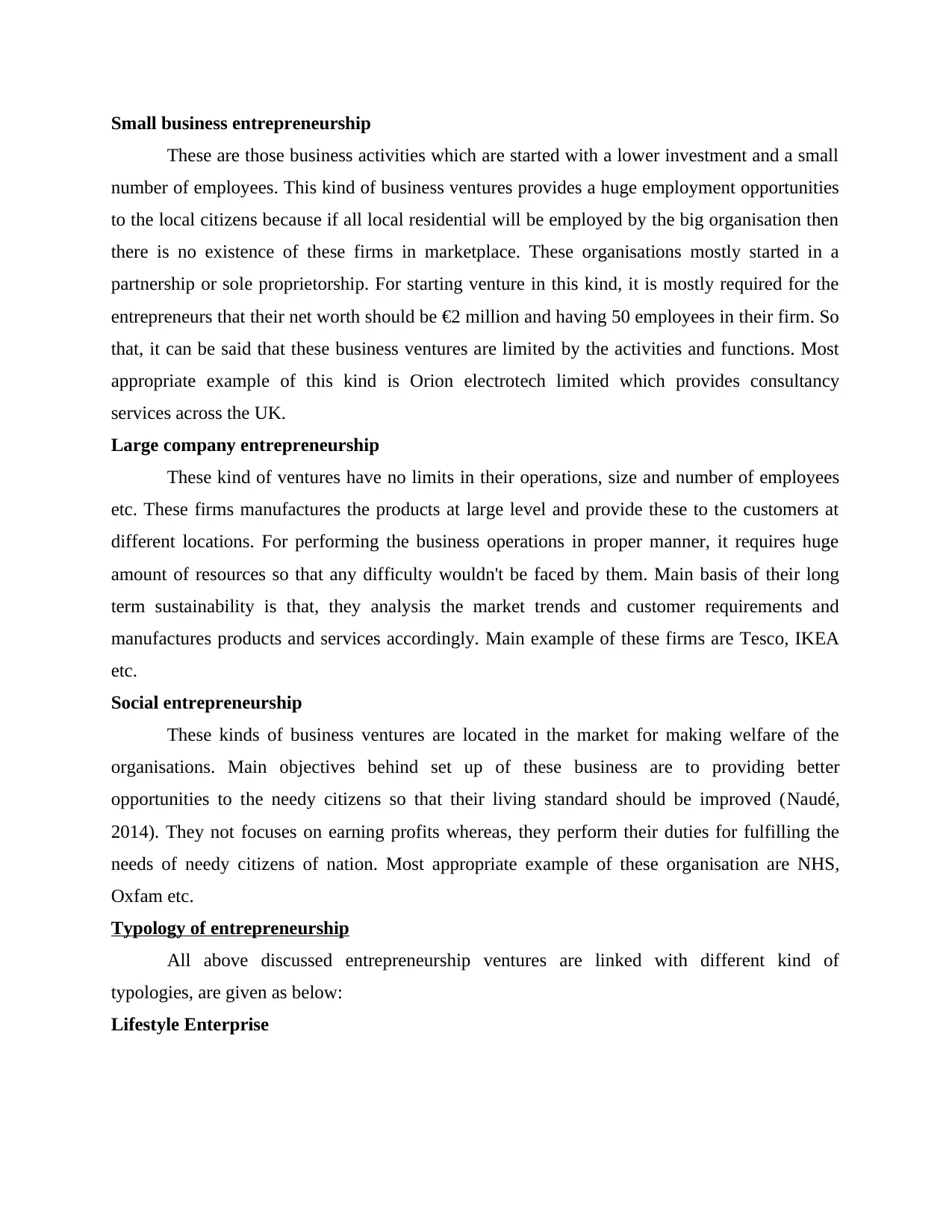
Small business entrepreneurship
These are those business activities which are started with a lower investment and a small
number of employees. This kind of business ventures provides a huge employment opportunities
to the local citizens because if all local residential will be employed by the big organisation then
there is no existence of these firms in marketplace. These organisations mostly started in a
partnership or sole proprietorship. For starting venture in this kind, it is mostly required for the
entrepreneurs that their net worth should be €2 million and having 50 employees in their firm. So
that, it can be said that these business ventures are limited by the activities and functions. Most
appropriate example of this kind is Orion electrotech limited which provides consultancy
services across the UK.
Large company entrepreneurship
These kind of ventures have no limits in their operations, size and number of employees
etc. These firms manufactures the products at large level and provide these to the customers at
different locations. For performing the business operations in proper manner, it requires huge
amount of resources so that any difficulty wouldn't be faced by them. Main basis of their long
term sustainability is that, they analysis the market trends and customer requirements and
manufactures products and services accordingly. Main example of these firms are Tesco, IKEA
etc.
Social entrepreneurship
These kinds of business ventures are located in the market for making welfare of the
organisations. Main objectives behind set up of these business are to providing better
opportunities to the needy citizens so that their living standard should be improved (Naudé,
2014). They not focuses on earning profits whereas, they perform their duties for fulfilling the
needs of needy citizens of nation. Most appropriate example of these organisation are NHS,
Oxfam etc.
Typology of entrepreneurship
All above discussed entrepreneurship ventures are linked with different kind of
typologies, are given as below:
Lifestyle Enterprise
These are those business activities which are started with a lower investment and a small
number of employees. This kind of business ventures provides a huge employment opportunities
to the local citizens because if all local residential will be employed by the big organisation then
there is no existence of these firms in marketplace. These organisations mostly started in a
partnership or sole proprietorship. For starting venture in this kind, it is mostly required for the
entrepreneurs that their net worth should be €2 million and having 50 employees in their firm. So
that, it can be said that these business ventures are limited by the activities and functions. Most
appropriate example of this kind is Orion electrotech limited which provides consultancy
services across the UK.
Large company entrepreneurship
These kind of ventures have no limits in their operations, size and number of employees
etc. These firms manufactures the products at large level and provide these to the customers at
different locations. For performing the business operations in proper manner, it requires huge
amount of resources so that any difficulty wouldn't be faced by them. Main basis of their long
term sustainability is that, they analysis the market trends and customer requirements and
manufactures products and services accordingly. Main example of these firms are Tesco, IKEA
etc.
Social entrepreneurship
These kinds of business ventures are located in the market for making welfare of the
organisations. Main objectives behind set up of these business are to providing better
opportunities to the needy citizens so that their living standard should be improved (Naudé,
2014). They not focuses on earning profits whereas, they perform their duties for fulfilling the
needs of needy citizens of nation. Most appropriate example of these organisation are NHS,
Oxfam etc.
Typology of entrepreneurship
All above discussed entrepreneurship ventures are linked with different kind of
typologies, are given as below:
Lifestyle Enterprise
Paraphrase This Document
Need a fresh take? Get an instant paraphrase of this document with our AI Paraphraser
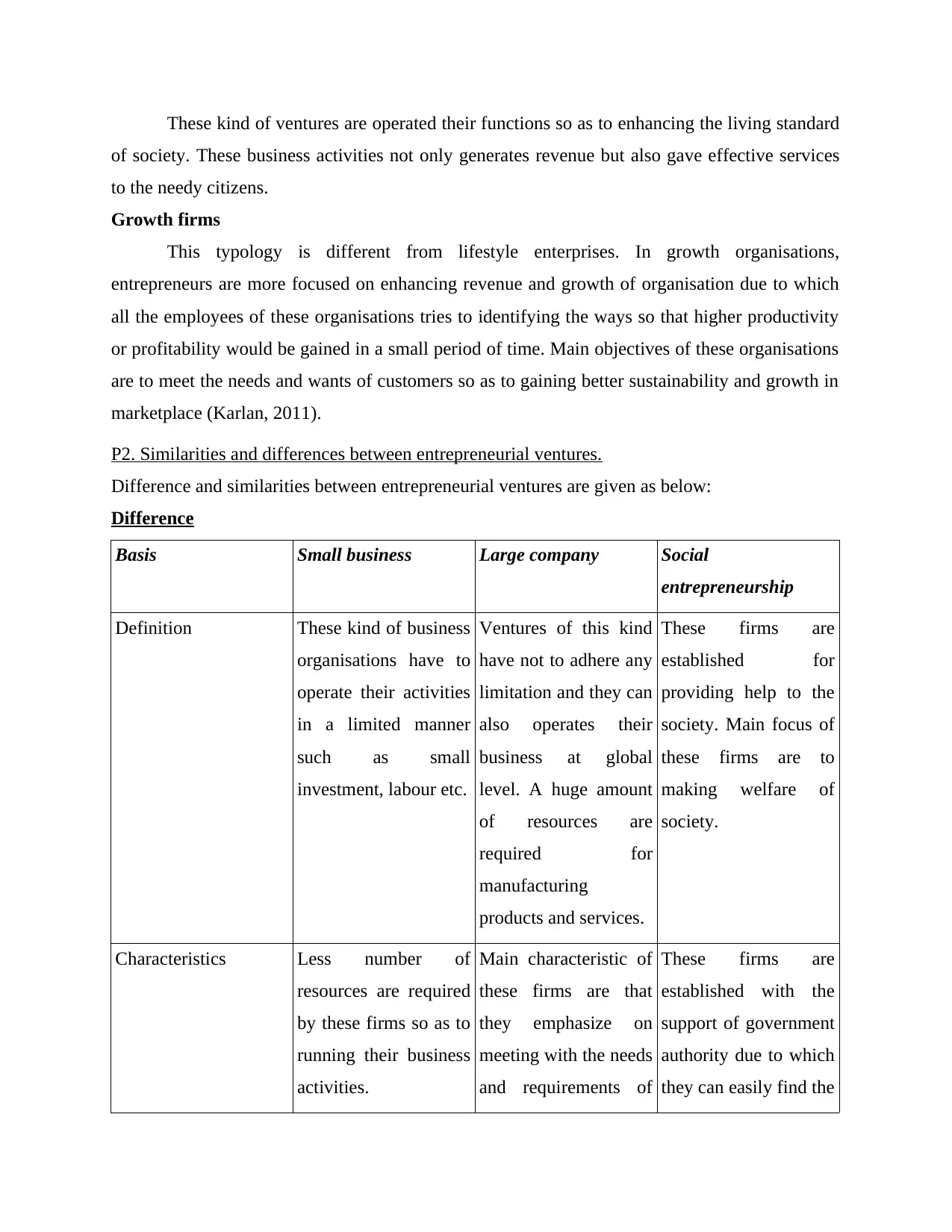
These kind of ventures are operated their functions so as to enhancing the living standard
of society. These business activities not only generates revenue but also gave effective services
to the needy citizens.
Growth firms
This typology is different from lifestyle enterprises. In growth organisations,
entrepreneurs are more focused on enhancing revenue and growth of organisation due to which
all the employees of these organisations tries to identifying the ways so that higher productivity
or profitability would be gained in a small period of time. Main objectives of these organisations
are to meet the needs and wants of customers so as to gaining better sustainability and growth in
marketplace (Karlan, 2011).
P2. Similarities and differences between entrepreneurial ventures.
Difference and similarities between entrepreneurial ventures are given as below:
Difference
Basis Small business Large company Social
entrepreneurship
Definition These kind of business
organisations have to
operate their activities
in a limited manner
such as small
investment, labour etc.
Ventures of this kind
have not to adhere any
limitation and they can
also operates their
business at global
level. A huge amount
of resources are
required for
manufacturing
products and services.
These firms are
established for
providing help to the
society. Main focus of
these firms are to
making welfare of
society.
Characteristics Less number of
resources are required
by these firms so as to
running their business
activities.
Main characteristic of
these firms are that
they emphasize on
meeting with the needs
and requirements of
These firms are
established with the
support of government
authority due to which
they can easily find the
of society. These business activities not only generates revenue but also gave effective services
to the needy citizens.
Growth firms
This typology is different from lifestyle enterprises. In growth organisations,
entrepreneurs are more focused on enhancing revenue and growth of organisation due to which
all the employees of these organisations tries to identifying the ways so that higher productivity
or profitability would be gained in a small period of time. Main objectives of these organisations
are to meet the needs and wants of customers so as to gaining better sustainability and growth in
marketplace (Karlan, 2011).
P2. Similarities and differences between entrepreneurial ventures.
Difference and similarities between entrepreneurial ventures are given as below:
Difference
Basis Small business Large company Social
entrepreneurship
Definition These kind of business
organisations have to
operate their activities
in a limited manner
such as small
investment, labour etc.
Ventures of this kind
have not to adhere any
limitation and they can
also operates their
business at global
level. A huge amount
of resources are
required for
manufacturing
products and services.
These firms are
established for
providing help to the
society. Main focus of
these firms are to
making welfare of
society.
Characteristics Less number of
resources are required
by these firms so as to
running their business
activities.
Main characteristic of
these firms are that
they emphasize on
meeting with the needs
and requirements of
These firms are
established with the
support of government
authority due to which
they can easily find the
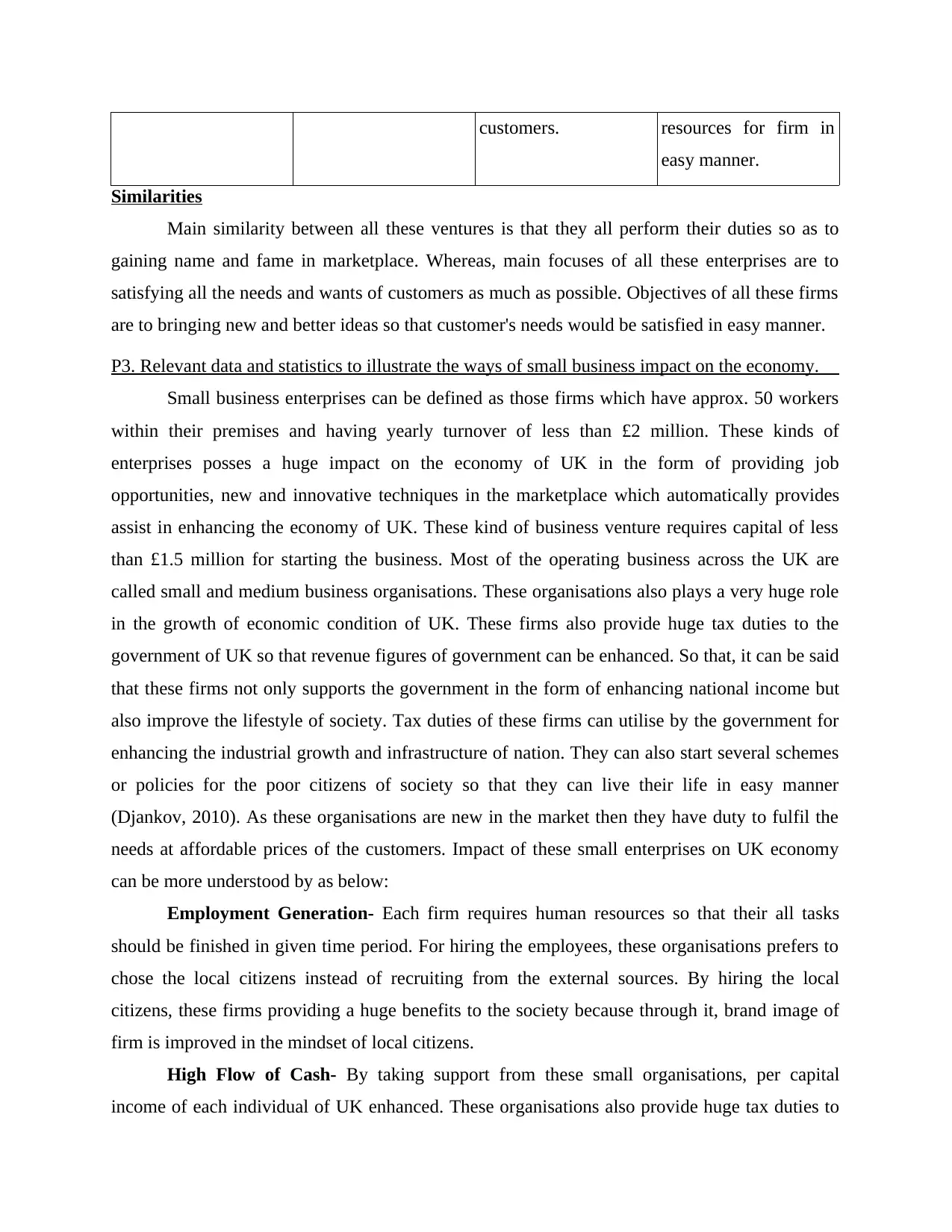
customers. resources for firm in
easy manner.
Similarities
Main similarity between all these ventures is that they all perform their duties so as to
gaining name and fame in marketplace. Whereas, main focuses of all these enterprises are to
satisfying all the needs and wants of customers as much as possible. Objectives of all these firms
are to bringing new and better ideas so that customer's needs would be satisfied in easy manner.
P3. Relevant data and statistics to illustrate the ways of small business impact on the economy.
Small business enterprises can be defined as those firms which have approx. 50 workers
within their premises and having yearly turnover of less than £2 million. These kinds of
enterprises posses a huge impact on the economy of UK in the form of providing job
opportunities, new and innovative techniques in the marketplace which automatically provides
assist in enhancing the economy of UK. These kind of business venture requires capital of less
than £1.5 million for starting the business. Most of the operating business across the UK are
called small and medium business organisations. These organisations also plays a very huge role
in the growth of economic condition of UK. These firms also provide huge tax duties to the
government of UK so that revenue figures of government can be enhanced. So that, it can be said
that these firms not only supports the government in the form of enhancing national income but
also improve the lifestyle of society. Tax duties of these firms can utilise by the government for
enhancing the industrial growth and infrastructure of nation. They can also start several schemes
or policies for the poor citizens of society so that they can live their life in easy manner
(Djankov, 2010). As these organisations are new in the market then they have duty to fulfil the
needs at affordable prices of the customers. Impact of these small enterprises on UK economy
can be more understood by as below:
Employment Generation- Each firm requires human resources so that their all tasks
should be finished in given time period. For hiring the employees, these organisations prefers to
chose the local citizens instead of recruiting from the external sources. By hiring the local
citizens, these firms providing a huge benefits to the society because through it, brand image of
firm is improved in the mindset of local citizens.
High Flow of Cash- By taking support from these small organisations, per capital
income of each individual of UK enhanced. These organisations also provide huge tax duties to
easy manner.
Similarities
Main similarity between all these ventures is that they all perform their duties so as to
gaining name and fame in marketplace. Whereas, main focuses of all these enterprises are to
satisfying all the needs and wants of customers as much as possible. Objectives of all these firms
are to bringing new and better ideas so that customer's needs would be satisfied in easy manner.
P3. Relevant data and statistics to illustrate the ways of small business impact on the economy.
Small business enterprises can be defined as those firms which have approx. 50 workers
within their premises and having yearly turnover of less than £2 million. These kinds of
enterprises posses a huge impact on the economy of UK in the form of providing job
opportunities, new and innovative techniques in the marketplace which automatically provides
assist in enhancing the economy of UK. These kind of business venture requires capital of less
than £1.5 million for starting the business. Most of the operating business across the UK are
called small and medium business organisations. These organisations also plays a very huge role
in the growth of economic condition of UK. These firms also provide huge tax duties to the
government of UK so that revenue figures of government can be enhanced. So that, it can be said
that these firms not only supports the government in the form of enhancing national income but
also improve the lifestyle of society. Tax duties of these firms can utilise by the government for
enhancing the industrial growth and infrastructure of nation. They can also start several schemes
or policies for the poor citizens of society so that they can live their life in easy manner
(Djankov, 2010). As these organisations are new in the market then they have duty to fulfil the
needs at affordable prices of the customers. Impact of these small enterprises on UK economy
can be more understood by as below:
Employment Generation- Each firm requires human resources so that their all tasks
should be finished in given time period. For hiring the employees, these organisations prefers to
chose the local citizens instead of recruiting from the external sources. By hiring the local
citizens, these firms providing a huge benefits to the society because through it, brand image of
firm is improved in the mindset of local citizens.
High Flow of Cash- By taking support from these small organisations, per capital
income of each individual of UK enhanced. These organisations also provide huge tax duties to
⊘ This is a preview!⊘
Do you want full access?
Subscribe today to unlock all pages.

Trusted by 1+ million students worldwide
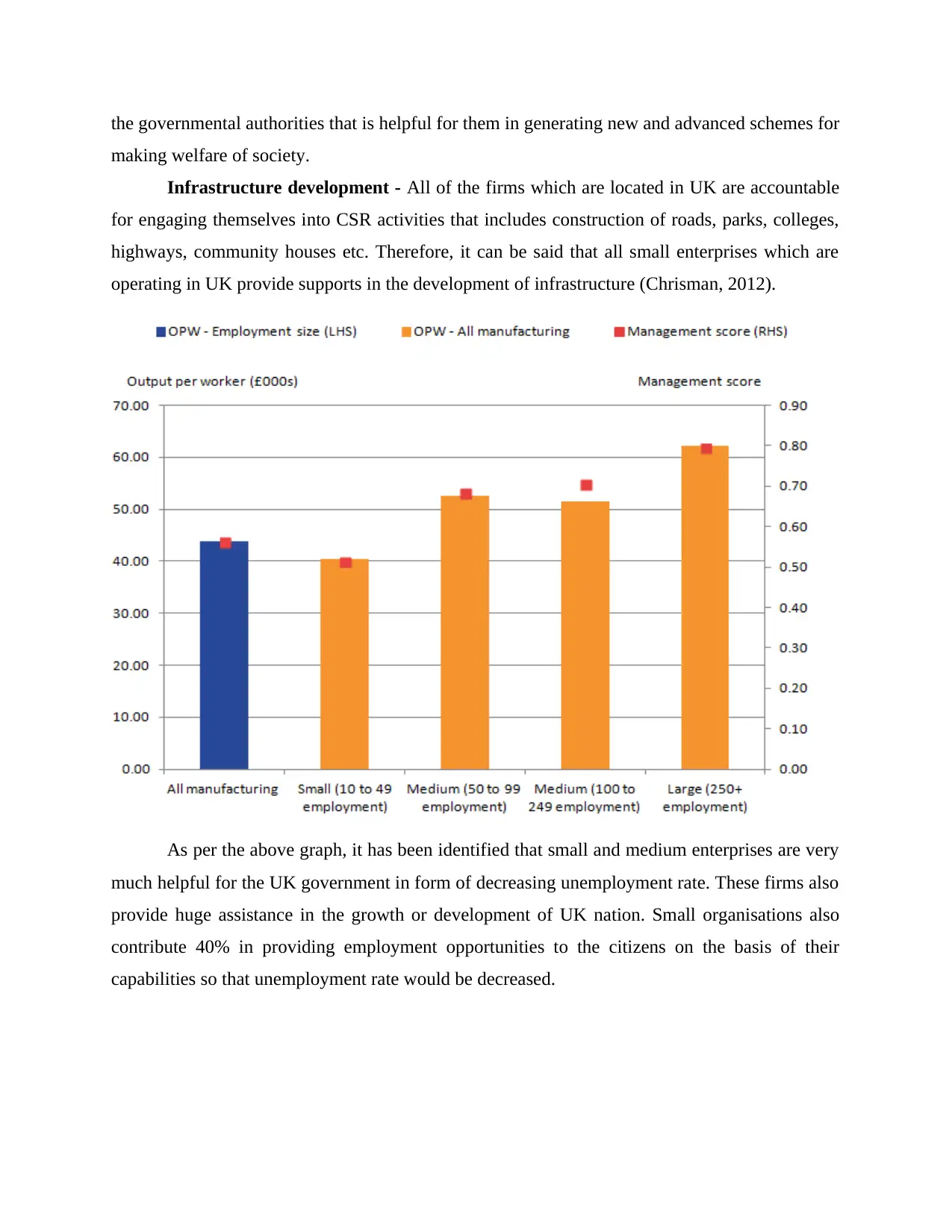
the governmental authorities that is helpful for them in generating new and advanced schemes for
making welfare of society.
Infrastructure development - All of the firms which are located in UK are accountable
for engaging themselves into CSR activities that includes construction of roads, parks, colleges,
highways, community houses etc. Therefore, it can be said that all small enterprises which are
operating in UK provide supports in the development of infrastructure (Chrisman, 2012).
As per the above graph, it has been identified that small and medium enterprises are very
much helpful for the UK government in form of decreasing unemployment rate. These firms also
provide huge assistance in the growth or development of UK nation. Small organisations also
contribute 40% in providing employment opportunities to the citizens on the basis of their
capabilities so that unemployment rate would be decreased.
making welfare of society.
Infrastructure development - All of the firms which are located in UK are accountable
for engaging themselves into CSR activities that includes construction of roads, parks, colleges,
highways, community houses etc. Therefore, it can be said that all small enterprises which are
operating in UK provide supports in the development of infrastructure (Chrisman, 2012).
As per the above graph, it has been identified that small and medium enterprises are very
much helpful for the UK government in form of decreasing unemployment rate. These firms also
provide huge assistance in the growth or development of UK nation. Small organisations also
contribute 40% in providing employment opportunities to the citizens on the basis of their
capabilities so that unemployment rate would be decreased.
Paraphrase This Document
Need a fresh take? Get an instant paraphrase of this document with our AI Paraphraser
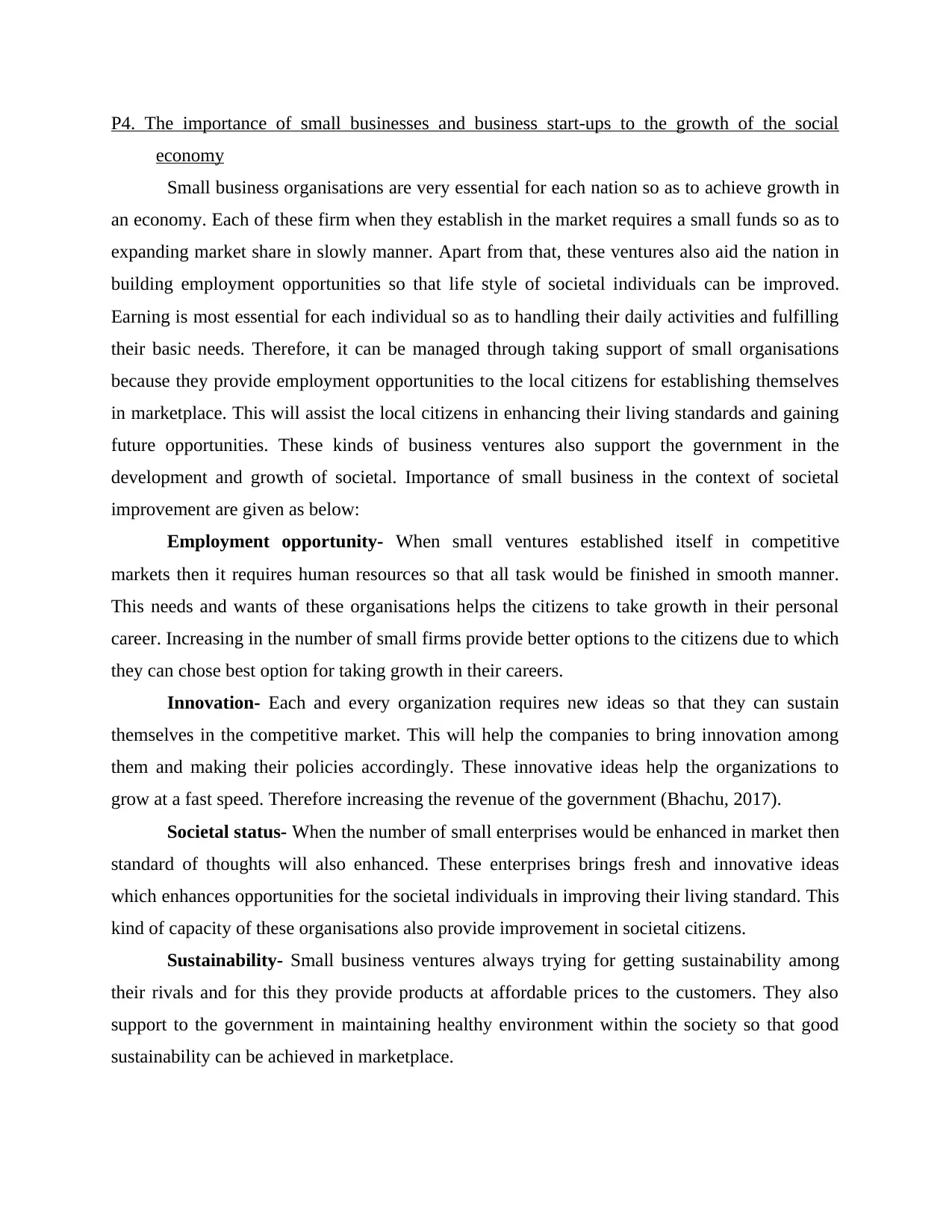
P4. The importance of small businesses and business start-ups to the growth of the social
economy
Small business organisations are very essential for each nation so as to achieve growth in
an economy. Each of these firm when they establish in the market requires a small funds so as to
expanding market share in slowly manner. Apart from that, these ventures also aid the nation in
building employment opportunities so that life style of societal individuals can be improved.
Earning is most essential for each individual so as to handling their daily activities and fulfilling
their basic needs. Therefore, it can be managed through taking support of small organisations
because they provide employment opportunities to the local citizens for establishing themselves
in marketplace. This will assist the local citizens in enhancing their living standards and gaining
future opportunities. These kinds of business ventures also support the government in the
development and growth of societal. Importance of small business in the context of societal
improvement are given as below:
Employment opportunity- When small ventures established itself in competitive
markets then it requires human resources so that all task would be finished in smooth manner.
This needs and wants of these organisations helps the citizens to take growth in their personal
career. Increasing in the number of small firms provide better options to the citizens due to which
they can chose best option for taking growth in their careers.
Innovation- Each and every organization requires new ideas so that they can sustain
themselves in the competitive market. This will help the companies to bring innovation among
them and making their policies accordingly. These innovative ideas help the organizations to
grow at a fast speed. Therefore increasing the revenue of the government (Bhachu, 2017).
Societal status- When the number of small enterprises would be enhanced in market then
standard of thoughts will also enhanced. These enterprises brings fresh and innovative ideas
which enhances opportunities for the societal individuals in improving their living standard. This
kind of capacity of these organisations also provide improvement in societal citizens.
Sustainability- Small business ventures always trying for getting sustainability among
their rivals and for this they provide products at affordable prices to the customers. They also
support to the government in maintaining healthy environment within the society so that good
sustainability can be achieved in marketplace.
economy
Small business organisations are very essential for each nation so as to achieve growth in
an economy. Each of these firm when they establish in the market requires a small funds so as to
expanding market share in slowly manner. Apart from that, these ventures also aid the nation in
building employment opportunities so that life style of societal individuals can be improved.
Earning is most essential for each individual so as to handling their daily activities and fulfilling
their basic needs. Therefore, it can be managed through taking support of small organisations
because they provide employment opportunities to the local citizens for establishing themselves
in marketplace. This will assist the local citizens in enhancing their living standards and gaining
future opportunities. These kinds of business ventures also support the government in the
development and growth of societal. Importance of small business in the context of societal
improvement are given as below:
Employment opportunity- When small ventures established itself in competitive
markets then it requires human resources so that all task would be finished in smooth manner.
This needs and wants of these organisations helps the citizens to take growth in their personal
career. Increasing in the number of small firms provide better options to the citizens due to which
they can chose best option for taking growth in their careers.
Innovation- Each and every organization requires new ideas so that they can sustain
themselves in the competitive market. This will help the companies to bring innovation among
them and making their policies accordingly. These innovative ideas help the organizations to
grow at a fast speed. Therefore increasing the revenue of the government (Bhachu, 2017).
Societal status- When the number of small enterprises would be enhanced in market then
standard of thoughts will also enhanced. These enterprises brings fresh and innovative ideas
which enhances opportunities for the societal individuals in improving their living standard. This
kind of capacity of these organisations also provide improvement in societal citizens.
Sustainability- Small business ventures always trying for getting sustainability among
their rivals and for this they provide products at affordable prices to the customers. They also
support to the government in maintaining healthy environment within the society so that good
sustainability can be achieved in marketplace.
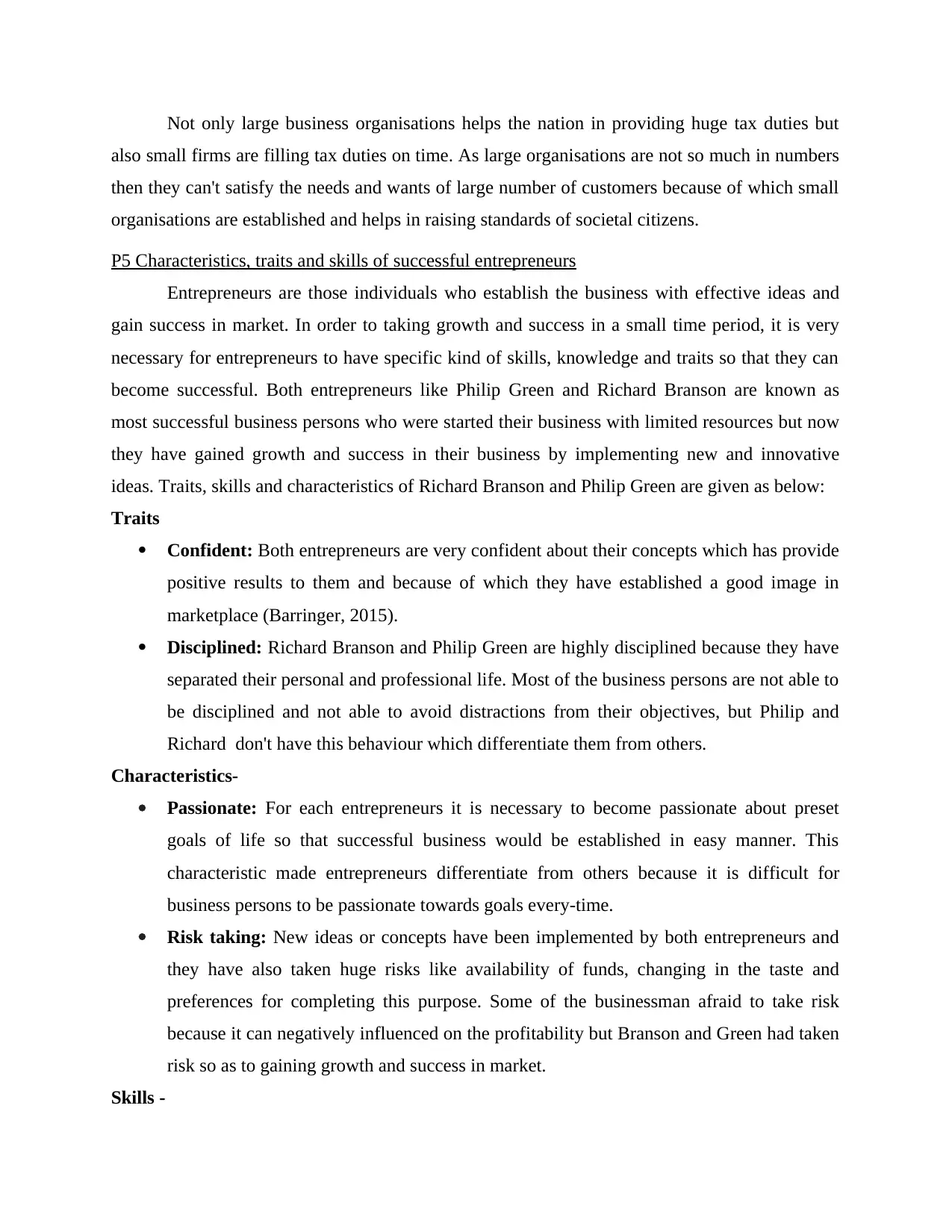
Not only large business organisations helps the nation in providing huge tax duties but
also small firms are filling tax duties on time. As large organisations are not so much in numbers
then they can't satisfy the needs and wants of large number of customers because of which small
organisations are established and helps in raising standards of societal citizens.
P5 Characteristics, traits and skills of successful entrepreneurs
Entrepreneurs are those individuals who establish the business with effective ideas and
gain success in market. In order to taking growth and success in a small time period, it is very
necessary for entrepreneurs to have specific kind of skills, knowledge and traits so that they can
become successful. Both entrepreneurs like Philip Green and Richard Branson are known as
most successful business persons who were started their business with limited resources but now
they have gained growth and success in their business by implementing new and innovative
ideas. Traits, skills and characteristics of Richard Branson and Philip Green are given as below:
Traits
Confident: Both entrepreneurs are very confident about their concepts which has provide
positive results to them and because of which they have established a good image in
marketplace (Barringer, 2015).
Disciplined: Richard Branson and Philip Green are highly disciplined because they have
separated their personal and professional life. Most of the business persons are not able to
be disciplined and not able to avoid distractions from their objectives, but Philip and
Richard don't have this behaviour which differentiate them from others.
Characteristics-
Passionate: For each entrepreneurs it is necessary to become passionate about preset
goals of life so that successful business would be established in easy manner. This
characteristic made entrepreneurs differentiate from others because it is difficult for
business persons to be passionate towards goals every-time.
Risk taking: New ideas or concepts have been implemented by both entrepreneurs and
they have also taken huge risks like availability of funds, changing in the taste and
preferences for completing this purpose. Some of the businessman afraid to take risk
because it can negatively influenced on the profitability but Branson and Green had taken
risk so as to gaining growth and success in market.
Skills -
also small firms are filling tax duties on time. As large organisations are not so much in numbers
then they can't satisfy the needs and wants of large number of customers because of which small
organisations are established and helps in raising standards of societal citizens.
P5 Characteristics, traits and skills of successful entrepreneurs
Entrepreneurs are those individuals who establish the business with effective ideas and
gain success in market. In order to taking growth and success in a small time period, it is very
necessary for entrepreneurs to have specific kind of skills, knowledge and traits so that they can
become successful. Both entrepreneurs like Philip Green and Richard Branson are known as
most successful business persons who were started their business with limited resources but now
they have gained growth and success in their business by implementing new and innovative
ideas. Traits, skills and characteristics of Richard Branson and Philip Green are given as below:
Traits
Confident: Both entrepreneurs are very confident about their concepts which has provide
positive results to them and because of which they have established a good image in
marketplace (Barringer, 2015).
Disciplined: Richard Branson and Philip Green are highly disciplined because they have
separated their personal and professional life. Most of the business persons are not able to
be disciplined and not able to avoid distractions from their objectives, but Philip and
Richard don't have this behaviour which differentiate them from others.
Characteristics-
Passionate: For each entrepreneurs it is necessary to become passionate about preset
goals of life so that successful business would be established in easy manner. This
characteristic made entrepreneurs differentiate from others because it is difficult for
business persons to be passionate towards goals every-time.
Risk taking: New ideas or concepts have been implemented by both entrepreneurs and
they have also taken huge risks like availability of funds, changing in the taste and
preferences for completing this purpose. Some of the businessman afraid to take risk
because it can negatively influenced on the profitability but Branson and Green had taken
risk so as to gaining growth and success in market.
Skills -
⊘ This is a preview!⊘
Do you want full access?
Subscribe today to unlock all pages.

Trusted by 1+ million students worldwide
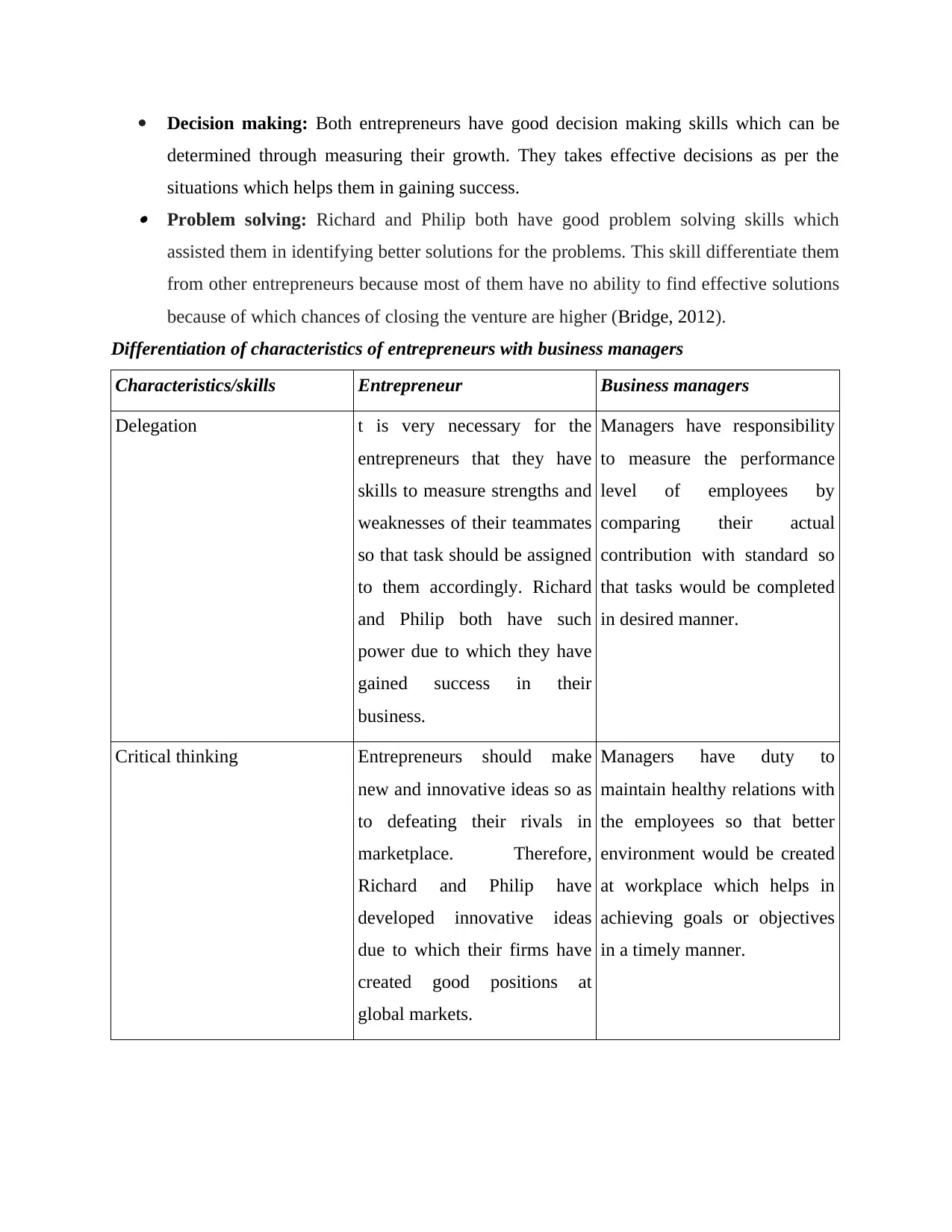
Decision making: Both entrepreneurs have good decision making skills which can be
determined through measuring their growth. They takes effective decisions as per the
situations which helps them in gaining success. Problem solving: Richard and Philip both have good problem solving skills which
assisted them in identifying better solutions for the problems. This skill differentiate them
from other entrepreneurs because most of them have no ability to find effective solutions
because of which chances of closing the venture are higher (Bridge, 2012).
Differentiation of characteristics of entrepreneurs with business managers
Characteristics/skills Entrepreneur Business managers
Delegation t is very necessary for the
entrepreneurs that they have
skills to measure strengths and
weaknesses of their teammates
so that task should be assigned
to them accordingly. Richard
and Philip both have such
power due to which they have
gained success in their
business.
Managers have responsibility
to measure the performance
level of employees by
comparing their actual
contribution with standard so
that tasks would be completed
in desired manner.
Critical thinking Entrepreneurs should make
new and innovative ideas so as
to defeating their rivals in
marketplace. Therefore,
Richard and Philip have
developed innovative ideas
due to which their firms have
created good positions at
global markets.
Managers have duty to
maintain healthy relations with
the employees so that better
environment would be created
at workplace which helps in
achieving goals or objectives
in a timely manner.
determined through measuring their growth. They takes effective decisions as per the
situations which helps them in gaining success. Problem solving: Richard and Philip both have good problem solving skills which
assisted them in identifying better solutions for the problems. This skill differentiate them
from other entrepreneurs because most of them have no ability to find effective solutions
because of which chances of closing the venture are higher (Bridge, 2012).
Differentiation of characteristics of entrepreneurs with business managers
Characteristics/skills Entrepreneur Business managers
Delegation t is very necessary for the
entrepreneurs that they have
skills to measure strengths and
weaknesses of their teammates
so that task should be assigned
to them accordingly. Richard
and Philip both have such
power due to which they have
gained success in their
business.
Managers have responsibility
to measure the performance
level of employees by
comparing their actual
contribution with standard so
that tasks would be completed
in desired manner.
Critical thinking Entrepreneurs should make
new and innovative ideas so as
to defeating their rivals in
marketplace. Therefore,
Richard and Philip have
developed innovative ideas
due to which their firms have
created good positions at
global markets.
Managers have duty to
maintain healthy relations with
the employees so that better
environment would be created
at workplace which helps in
achieving goals or objectives
in a timely manner.
Paraphrase This Document
Need a fresh take? Get an instant paraphrase of this document with our AI Paraphraser
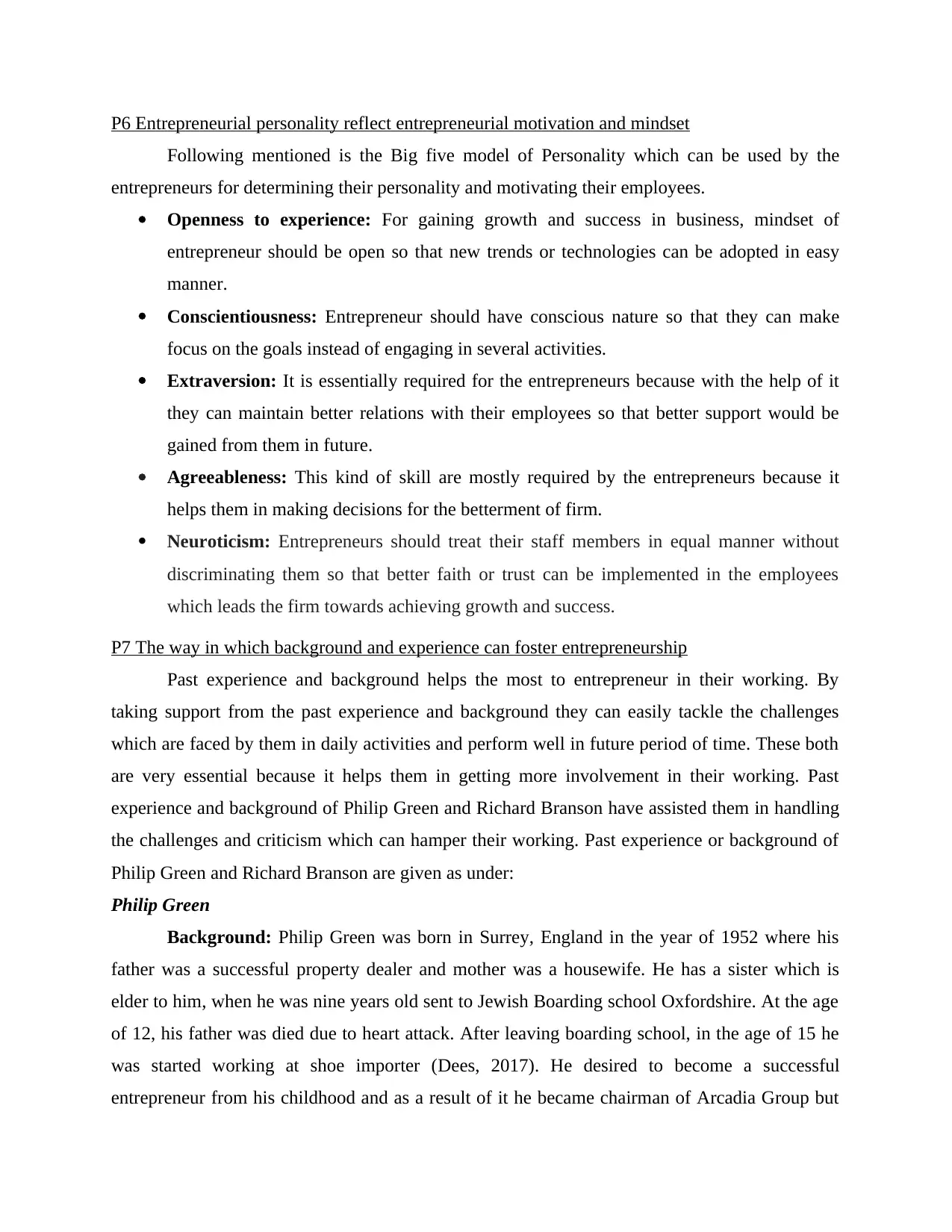
P6 Entrepreneurial personality reflect entrepreneurial motivation and mindset
Following mentioned is the Big five model of Personality which can be used by the
entrepreneurs for determining their personality and motivating their employees.
Openness to experience: For gaining growth and success in business, mindset of
entrepreneur should be open so that new trends or technologies can be adopted in easy
manner.
Conscientiousness: Entrepreneur should have conscious nature so that they can make
focus on the goals instead of engaging in several activities.
Extraversion: It is essentially required for the entrepreneurs because with the help of it
they can maintain better relations with their employees so that better support would be
gained from them in future.
Agreeableness: This kind of skill are mostly required by the entrepreneurs because it
helps them in making decisions for the betterment of firm.
Neuroticism: Entrepreneurs should treat their staff members in equal manner without
discriminating them so that better faith or trust can be implemented in the employees
which leads the firm towards achieving growth and success.
P7 The way in which background and experience can foster entrepreneurship
Past experience and background helps the most to entrepreneur in their working. By
taking support from the past experience and background they can easily tackle the challenges
which are faced by them in daily activities and perform well in future period of time. These both
are very essential because it helps them in getting more involvement in their working. Past
experience and background of Philip Green and Richard Branson have assisted them in handling
the challenges and criticism which can hamper their working. Past experience or background of
Philip Green and Richard Branson are given as under:
Philip Green
Background: Philip Green was born in Surrey, England in the year of 1952 where his
father was a successful property dealer and mother was a housewife. He has a sister which is
elder to him, when he was nine years old sent to Jewish Boarding school Oxfordshire. At the age
of 12, his father was died due to heart attack. After leaving boarding school, in the age of 15 he
was started working at shoe importer (Dees, 2017). He desired to become a successful
entrepreneur from his childhood and as a result of it he became chairman of Arcadia Group but
Following mentioned is the Big five model of Personality which can be used by the
entrepreneurs for determining their personality and motivating their employees.
Openness to experience: For gaining growth and success in business, mindset of
entrepreneur should be open so that new trends or technologies can be adopted in easy
manner.
Conscientiousness: Entrepreneur should have conscious nature so that they can make
focus on the goals instead of engaging in several activities.
Extraversion: It is essentially required for the entrepreneurs because with the help of it
they can maintain better relations with their employees so that better support would be
gained from them in future.
Agreeableness: This kind of skill are mostly required by the entrepreneurs because it
helps them in making decisions for the betterment of firm.
Neuroticism: Entrepreneurs should treat their staff members in equal manner without
discriminating them so that better faith or trust can be implemented in the employees
which leads the firm towards achieving growth and success.
P7 The way in which background and experience can foster entrepreneurship
Past experience and background helps the most to entrepreneur in their working. By
taking support from the past experience and background they can easily tackle the challenges
which are faced by them in daily activities and perform well in future period of time. These both
are very essential because it helps them in getting more involvement in their working. Past
experience and background of Philip Green and Richard Branson have assisted them in handling
the challenges and criticism which can hamper their working. Past experience or background of
Philip Green and Richard Branson are given as under:
Philip Green
Background: Philip Green was born in Surrey, England in the year of 1952 where his
father was a successful property dealer and mother was a housewife. He has a sister which is
elder to him, when he was nine years old sent to Jewish Boarding school Oxfordshire. At the age
of 12, his father was died due to heart attack. After leaving boarding school, in the age of 15 he
was started working at shoe importer (Dees, 2017). He desired to become a successful
entrepreneur from his childhood and as a result of it he became chairman of Arcadia Group but
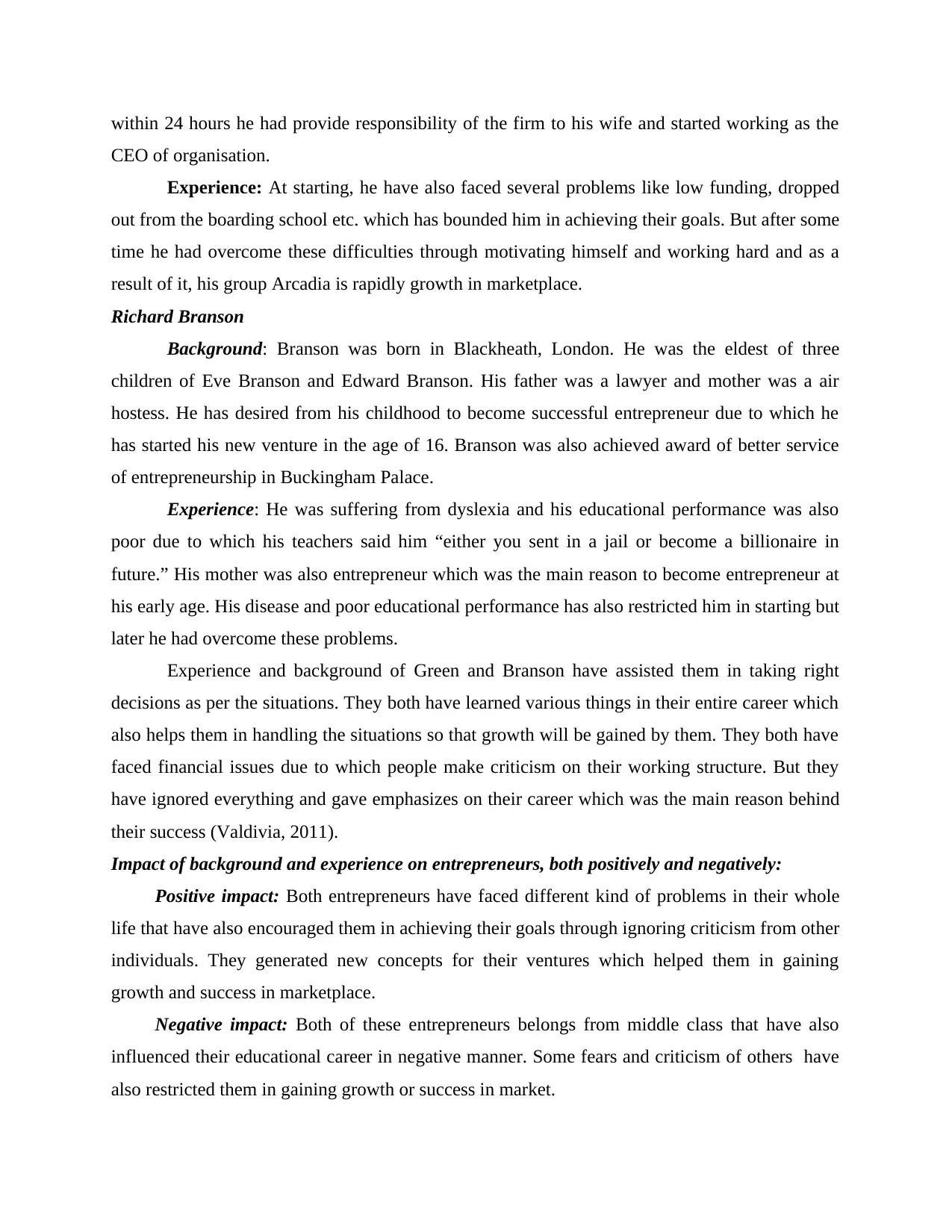
within 24 hours he had provide responsibility of the firm to his wife and started working as the
CEO of organisation.
Experience: At starting, he have also faced several problems like low funding, dropped
out from the boarding school etc. which has bounded him in achieving their goals. But after some
time he had overcome these difficulties through motivating himself and working hard and as a
result of it, his group Arcadia is rapidly growth in marketplace.
Richard Branson
Background: Branson was born in Blackheath, London. He was the eldest of three
children of Eve Branson and Edward Branson. His father was a lawyer and mother was a air
hostess. He has desired from his childhood to become successful entrepreneur due to which he
has started his new venture in the age of 16. Branson was also achieved award of better service
of entrepreneurship in Buckingham Palace.
Experience: He was suffering from dyslexia and his educational performance was also
poor due to which his teachers said him “either you sent in a jail or become a billionaire in
future.” His mother was also entrepreneur which was the main reason to become entrepreneur at
his early age. His disease and poor educational performance has also restricted him in starting but
later he had overcome these problems.
Experience and background of Green and Branson have assisted them in taking right
decisions as per the situations. They both have learned various things in their entire career which
also helps them in handling the situations so that growth will be gained by them. They both have
faced financial issues due to which people make criticism on their working structure. But they
have ignored everything and gave emphasizes on their career which was the main reason behind
their success (Valdivia, 2011).
Impact of background and experience on entrepreneurs, both positively and negatively:
Positive impact: Both entrepreneurs have faced different kind of problems in their whole
life that have also encouraged them in achieving their goals through ignoring criticism from other
individuals. They generated new concepts for their ventures which helped them in gaining
growth and success in marketplace.
Negative impact: Both of these entrepreneurs belongs from middle class that have also
influenced their educational career in negative manner. Some fears and criticism of others have
also restricted them in gaining growth or success in market.
CEO of organisation.
Experience: At starting, he have also faced several problems like low funding, dropped
out from the boarding school etc. which has bounded him in achieving their goals. But after some
time he had overcome these difficulties through motivating himself and working hard and as a
result of it, his group Arcadia is rapidly growth in marketplace.
Richard Branson
Background: Branson was born in Blackheath, London. He was the eldest of three
children of Eve Branson and Edward Branson. His father was a lawyer and mother was a air
hostess. He has desired from his childhood to become successful entrepreneur due to which he
has started his new venture in the age of 16. Branson was also achieved award of better service
of entrepreneurship in Buckingham Palace.
Experience: He was suffering from dyslexia and his educational performance was also
poor due to which his teachers said him “either you sent in a jail or become a billionaire in
future.” His mother was also entrepreneur which was the main reason to become entrepreneur at
his early age. His disease and poor educational performance has also restricted him in starting but
later he had overcome these problems.
Experience and background of Green and Branson have assisted them in taking right
decisions as per the situations. They both have learned various things in their entire career which
also helps them in handling the situations so that growth will be gained by them. They both have
faced financial issues due to which people make criticism on their working structure. But they
have ignored everything and gave emphasizes on their career which was the main reason behind
their success (Valdivia, 2011).
Impact of background and experience on entrepreneurs, both positively and negatively:
Positive impact: Both entrepreneurs have faced different kind of problems in their whole
life that have also encouraged them in achieving their goals through ignoring criticism from other
individuals. They generated new concepts for their ventures which helped them in gaining
growth and success in marketplace.
Negative impact: Both of these entrepreneurs belongs from middle class that have also
influenced their educational career in negative manner. Some fears and criticism of others have
also restricted them in gaining growth or success in market.
⊘ This is a preview!⊘
Do you want full access?
Subscribe today to unlock all pages.

Trusted by 1+ million students worldwide
1 out of 14
Related Documents
Your All-in-One AI-Powered Toolkit for Academic Success.
+13062052269
info@desklib.com
Available 24*7 on WhatsApp / Email
![[object Object]](/_next/static/media/star-bottom.7253800d.svg)
Unlock your academic potential
Copyright © 2020–2026 A2Z Services. All Rights Reserved. Developed and managed by ZUCOL.




